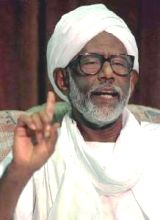Opposition Turabi criticizes Sudanese constitution
By TANALEE SMITH
KHARTOUM, Sudan, July 17, 2005 (AP) — Hassan Turabi, the one-time power behind attempts to bring an Islamic regime to Sudan and now an opposition leader, criticized the country’s new constitution Sunday, warning that it doesn’t guarantee democracy and freedom.
 Turabi, 73, helped bring President Omar al-Bashir to power in a 1989 coup, then worked to implement Islamic law. But he fell out with al-Bashir in 1999, spending most of his time since in prison. He was most recently freed June 30 after a year of house arrest.
Turabi, 73, helped bring President Omar al-Bashir to power in a 1989 coup, then worked to implement Islamic law. But he fell out with al-Bashir in 1999, spending most of his time since in prison. He was most recently freed June 30 after a year of house arrest.
He now positions himself as a proponent of democracy against al-Bashir’s authoritarian regime, allying his Popular Congress Party with the Umma Party, the largest opposition movement.
“There is no freedom” in Sudan, Turabi told The Associated Press in an interview Sunday.
Sudan’s constitution crowns a peace treaty reached with southern rebels in January after a 29-year civil war. The constitution ended emergency laws across much of Sudan and set up a government sharing power among al-Bashir’s ruling party, the rebels and northern opposition groups. Rebel leader John Garang was sworn in as vice president.
But Turabi, trained in constitutional law in Britain and France, said the constitution only enshrines al-Bashir’s power, pointing out that party is guaranteed 52 percent of government positions.
He said the inclusion of the southern Sudanese in the government brings “an equilibrium … which for the time being is in favor of proper freedom.”
“Whether you are a party, whether you’re a newspaper … now for the first few days they are allowed, because journalists and the U.N. were watching. But after a while I know the police will say, ‘Sorry, no rights.'”
Turabi has long been a powerful but mercurial figure in Sudanese politics. An Islamist thinker, he often points to his familiarity with the West – his law degrees from the University of London and the Sorbonne in Paris and his extensive travels.
Wearing a beige galabiya and his usual neatly wrapped white turban, the smiling, animated Turabi smoothly segued in the AP interview from constitutional talk to reminiscences of his two-month tour of the United States in the 1960s.
He said closer relations with the United States and the West would benefit Sudan.
“I’m partly a product of these places,” said Turabi. “Of course I want close relations.”
Turabi helped engineer the 1989 coup that toppled Sudan’s last democratically elected prime minister. He and al-Bashir together set up the sharia, or Islamic law, that governs northern Sudan. Turabi held a succession of posts, including attorney general, parliament speaker and vice president.
During the early 1990s, Sudan was accused of sheltering Islamic militant groups; Osama bin Laden made his home here until the government threw him out in 1996. Turabi backed Saddam Hussein in the first Gulf War, a move that helped make Sudan a pariah state.
But Turabi changed with the political mood. When he went behind the president’s back in 2001 to arrange a peace deal with southern rebels, al-Bashir accused him of power-grabbing and jailed him. His latest house arrest was for suspicion of planning a coup, a charge Turabi denies. Some accuse him of supporting rebels in Darfur, which he also denies.
Now he has allied with the Umma Party in demanding what he calls “the basics of democracy” – freedom of the press, freedom to form political parties, free elections.
Even his views on Islamic law seem more moderate. As attorney general in 1988, Turabi drafted a law imposing the death penalty for apostasy from Islam. But he said Sunday it was the president, not him, who advocated harsh punishments such as hand amputation for theft.
Turabi presents himself as an open-minded Muslim advocating equality for all. Unlike some strict Muslims, he shakes hands with women. He created a stir a few years ago when he had his daughter sign her own marriage contract rather than having a man sign on her behalf. Sharia, he says, is not really a law to govern by but “a guide for conscience and to organize society.”
He insists he wants the world’s help to bring real democracy to Sudan.
“If the world is interested, they need to put some pressure to bear … for real freedom and real democracy in this country,” he said. “We will try to play our share of pressure from below. Perhaps it may change Sudan.”
